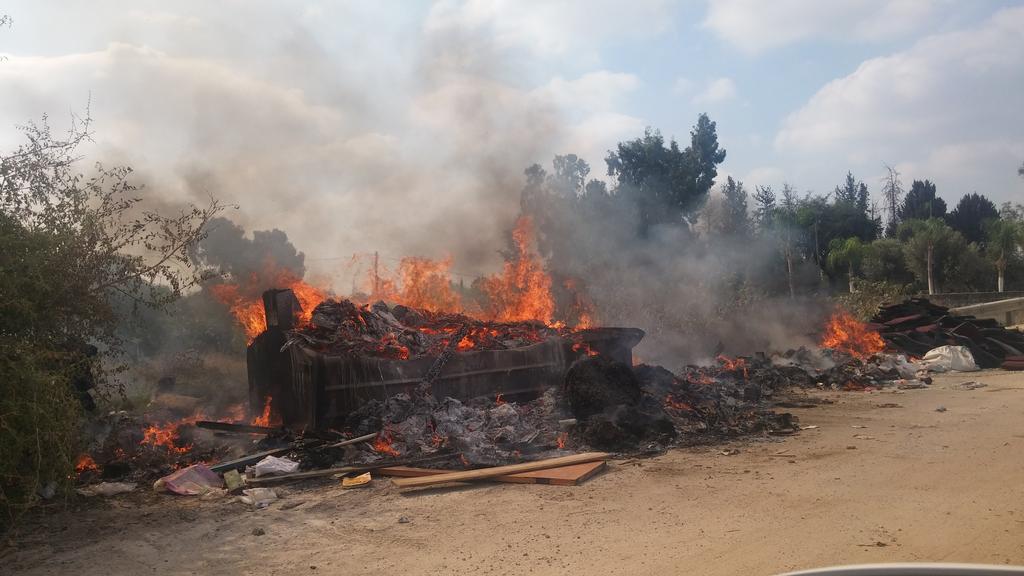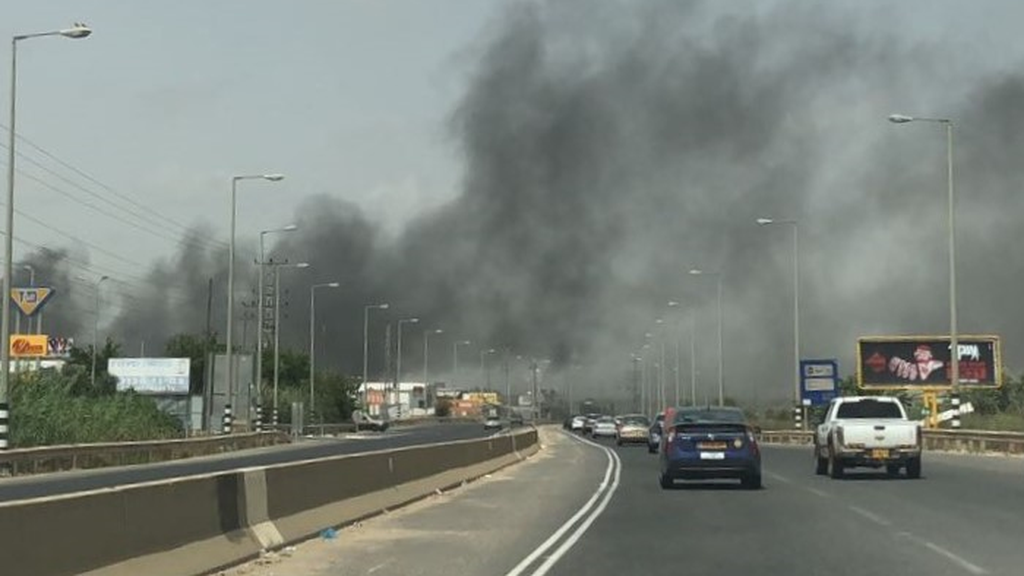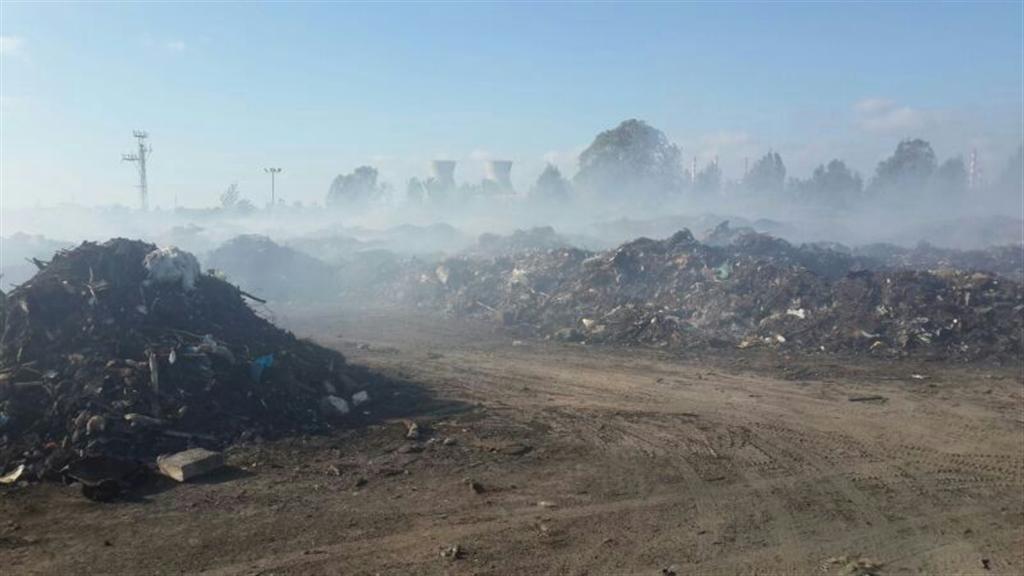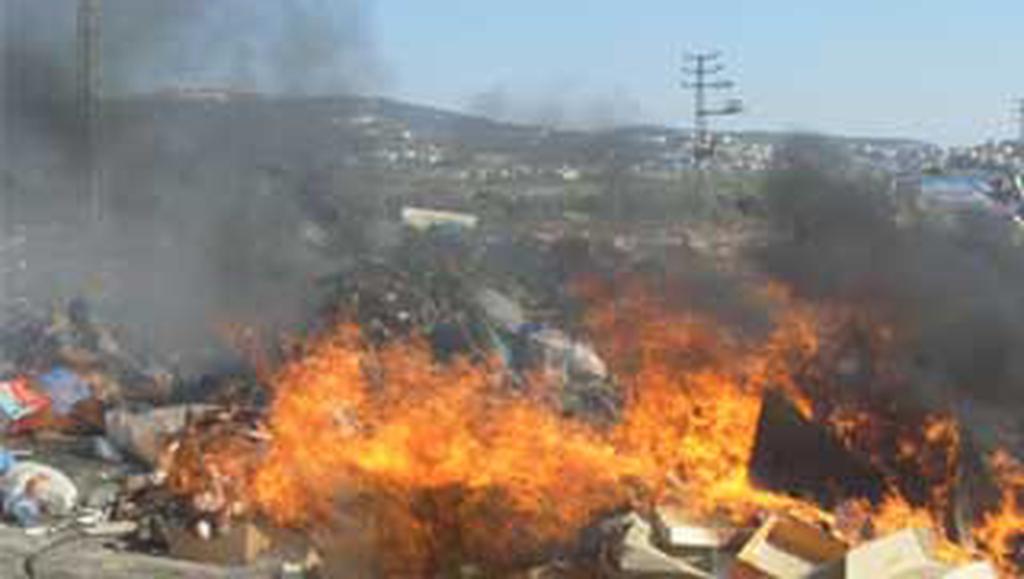Illegal garbage burning has destroyed the quality of life for residents in the city of Rosh Ha'ayin, with locals unable to even open a window or breathe in fresh air.
The smell of smoke is ever-present in the air around the neighborhood, emanating from an illegal dumping ground for domestic waste in the nearby city of Kafr Qasim.
4 View gallery


Trash is burned at the illegal site in central Israel
(Photo: Citizens for Clean Air)
For the past 18 months, the Rosh Ha'ayin residents have become prisoners in their own homes, trying to dodge the fumes.
"We thought we were moving out of the city to the fresh air and a better quality of life," said Emmanuel, a father of three who recently moved from a suburb of Tel Aviv.
"But we found the exact opposite and see our kids chocking on the smoke."
Hundreds of thousands of Israelis are suffering from the same hazardous pollution in a growing number of communities, mostly in the eastern areas of the country, putting their health in immediate danger and adversely affecting their quality of life.
A report issued by the Knesset Research and Information Office earlier this year warned that burning domestic garbage in illegal sites is harmful to the health of hundreds of thousands of Israelis.
The 47-page report outlining the dangers and concerns of illegal garbage burning sites has been submitted to the subcommittee on air pollution, but until a new Knesset is sworn in after the March 2020 elections, there is no expectation that anyone will take up the matter.
4 View gallery


Trash is burned at the illegal site in central Israel
(Photo: Citizens for Clean Air)
Garbage collectors prefer to discharge their loads at illegal dumping grounds because they can avoid paying the higher charges at official sites.
The amount of garbage produced by Israelis each year has been on the rise and only 20% of it is recycled.
Most of the garbage is dumped in open areas and burned in illegal sites run by criminal elements, who are raking in millions of shekels from this lucrative business.
People subjected to the smoke and smell report burning sensations in their eyes and noses, trouble breathing, headaches and even vomiting.
The long-range effects of exposure to the toxins released into the air by these fires can trigger asthma and bronchitis and could eventually cause cancer, heart disease and a host of other ailments.
Cat and mouse game
Gabai, a 41-year-old married father of two also moved into the neighborhood recently, only to discover the choking smoke that keeps them inside the house.
"We are not used to this," he said. "The smell of burning plastic and chemicals makes it impossible for us to step out onto our balcony."
Gabai said he contacted the authorities and did everything a concerned citizen could but nothing has helped.
"Officials at the Ministry of Environmental Protection came here to see for themselves," Emanuel said. "They confiscated a garbage truck. They are trying to help but it is a cat and mouse game and by the time the authorities arrive at the site, the criminals are long gone."
Rosh Ha'ayin's city helpline alone has recorded 180 calls since the beginning of 2019.
4 View gallery


Trash burned in the illegal site in northern Israel
(Photo: Israel Fire and Rescue Authority)
The Knesset report estimates a quarter of a billion tons of waste are burned annually and the Ministry of Environmental Protection says there are 300 illegal dumping and burning sites around the country.
The problem is compounded by a lack of funds needed to enforce the law, the report states.
There are only a small number of dedicated police officers responsible for a growing area and the Israel Police told the authors of the report that the volume of cases they must prosecute is immense and the department lacks not only manpower but also the technological tools to carry out their duties.
"This is a failure of the government that must be corrected," says Blue & White MK Yael German, a former health minister who headed the Knesset subcommittee on air pollution.
"Allegedly, crime cartels are in charge and are not easily pushed out," she says, adding that local councils and municipalities are making it difficult for legitimate companies to compete for the garbage collection tenders because of costs.
German's committee was considering different solutions, including black-listing service providers who bypass the law and opt for illegal dumping.
Since the government has been unable to enforce the law, it is forced to bear the financial burden of putting out the fires.
Local governments on their part often avoid the costs of cleaning up the sites making them attractive to repeat offenders.
"This government has left Israelis and their health by the roadside," says Yaniv Bleicher who chairs the Citizens for Clean Air organization, a non-profit advocacy group.
"The Knesset report should shake the country to the core," he says, adding that in addition to health concerns, the estimated cost to the economy of these illegal dumping sites is close to NIS 1 billion annually.


